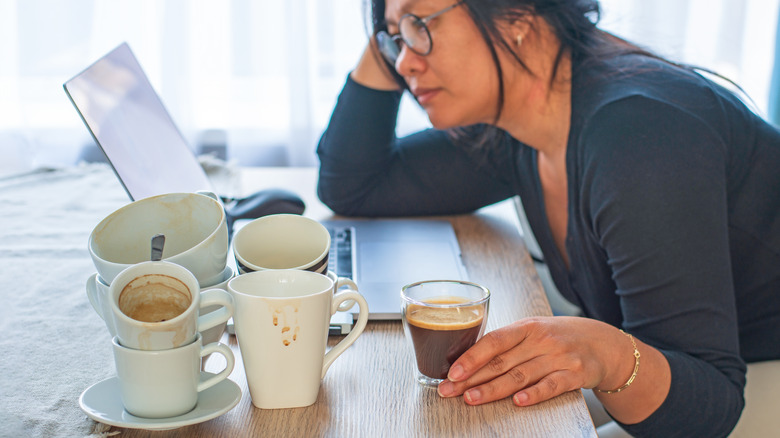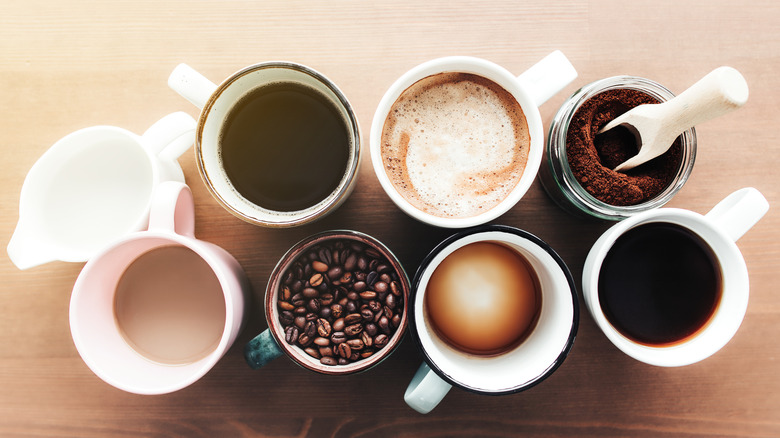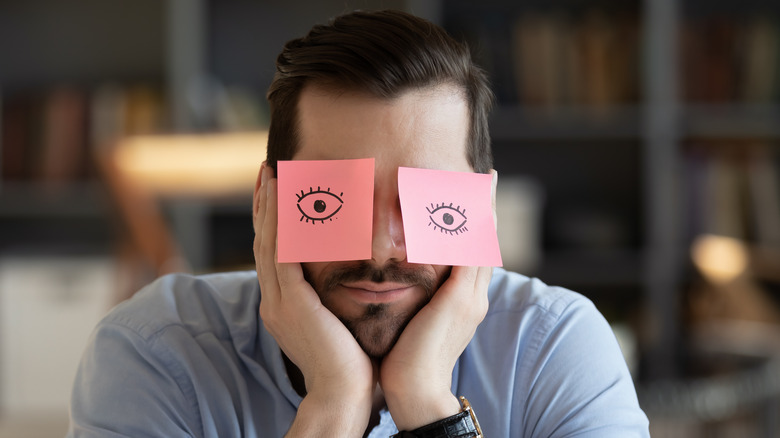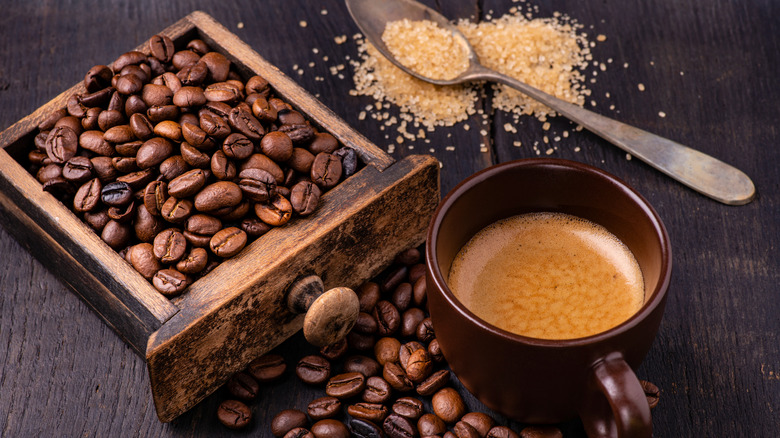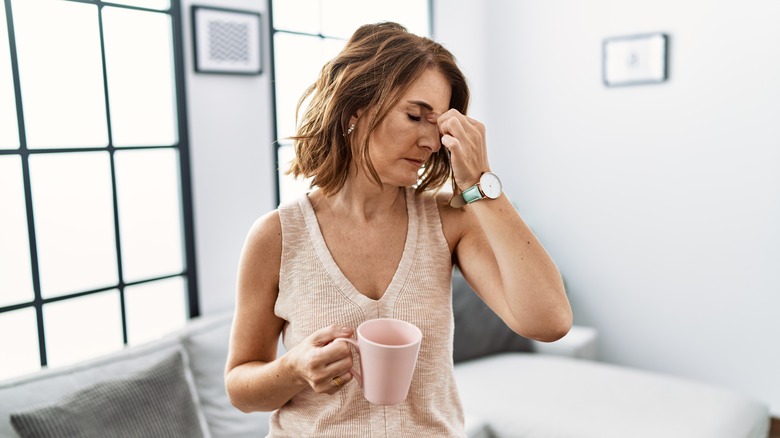What To Do If Coffee Is Making You More Tired Than Energized
Few things are more enjoyable than starting the day with a fresh cup of coffee. This delicious beverage gives you a jolt of energy, sharpens your senses, and warms you on those cold winter mornings. Caffeine, its primary compound, may also improve reaction time, mood, and working memory. But not everyone will experience these benefits, notes a review published in Cureus. In fact, some people actually feel more tired than energized after drinking their daily cup of java.
Caffeine is a natural stimulant that works on the central nervous system. After ingestion, it inhibits the depressant effects of adenosine, a neurotransmitter that causes sleepiness, according to the above review. However, caffeine affects people differently, and, in some cases, it's possible to develop a tolerance to it. If that happens, they may no longer feel energized and alert after drinking coffee.
"Although frequent consumers feel alerted by caffeine, especially by their morning tea, coffee, or other caffeine-containing drinks, evidence suggests that this is actually merely the reversal of the fatiguing effects of acute caffeine withdrawal," Peter Rogers, a professor at Bristol University, said to the BBC. That makes sense, but it doesn't explain why coffee makes you more tired than energized. What does the research say?
You may be drinking too much coffee
Coffee is supposed to wake you up, but sometimes, it has the opposite effect. One explanation is that heavy coffee drinkers have a larger number of adenosine receptors, according to clinical research published in Pharmacopsychoecologia. Therefore, they are more sensitive to the depressant effects of adenosine. Caffeine can temporarily reduce the sleepiness induced by adenosine, but you may start feeling tired after its stimulant effects wear off, neuroscientist Seth Blackshaw told The New York Times.
If that's the case, it makes sense to cut back on caffeine. Note that energy drinks, chocolate, and other foods or beverages contain this compound, too. For example, some teas have just as much caffeine as coffee but provide more sustained energy.
The Mayo Clinic recommends up to 400 milligrams of caffeine per day. For reference, black coffee has about 96 milligrams of caffeine per cup, whereas an espresso shot delivers 64 milligrams of caffeine. Energy shots can have more than 215 milligrams of caffeine per serving, which is more than half of the maximum recommended daily intake.
You might be sleep-deprived
Lack of sleep may play a role, too. "If you're using coffee to cover up the fact that you're sleep-deprived, you're still going to be tired," said neurologist Ronald Chervin in an interview with Well + Good. In this case, it's not the coffee that makes you tired and drowsy. You're already tired due to sleep deprivation, but you may feel slightly better after taking a few sips of coffee. However, its effects wear off pretty quickly — and you may end up feeling more tired than before drinking your cup of joe.
Rob van Dam, a professor of nutrition and epidemiology, told Well+Good that drinking coffee later in the day only makes things worse. This habit can affect your sleep, causing tiredness the next day. However, you may swap your late afternoon pick-me-up for chicory coffee, a beverage that tastes just like the real thing — but without caffeine. Plus, it's more nutritious than decaf coffee, offering large doses of folate, potassium, phosphorus, and inulin fiber, notes Healthline.
Apart from that, try to reset your sleep schedule and get more shuteye. "Fifteen- to 20-minute naps can actually do wonders for some people," Dr. Chervin said to Well + Good. Another piece of advice comes from Vox, which recommends taking coffee naps. Basically, you're supposed to drink a cup of coffee or other caffeinated beverages and then nap for up to 20 minutes. The caffeine will kick in by the time you wake up, leaving you feeling energized.
You're having too much sugar
How you drink your coffee can impact your mood and energy levels. Simple carbohydrates such as table sugar, honey, syrup, cookies, and white bread cause blood glucose spikes followed by crashes, notes Sanford Health. That means it's normal to feel tired if you drink your coffee with sugar or along with high-carb foods. In this case, you may also experience mood swings, fatigue, headaches, jitters, and diminished mental focus.
If you knew what happened in your body during a sugar crash, you may want to stick to black coffee and give your diet an overhaul.
For starters, consider drinking your coffee with stevia or ground cinnamon. Stevia, a natural sweetener, doesn't increase blood glucose levels, per a 2020 study published in the Avicenna Journal of Phytomedicine. Cinnamon, on the other hand, may help lower sugar levels when consumed in small amounts, according to clinical research presented in the International Journal of Food Science.
There could be mold in your coffee
Let's say you drink your coffee black, get enough sleep, and eat very little sugar, but you still feel tired after drinking coffee. In this case, there could be mold in your coffee. According to the World Health Organization, coffee beans may be contaminated with molds that produce mycotoxins. These microorganisms can withstand high heat and pose toxicity to humans.
For example, ochratoxin A may affect kidney function, immunity, and fetal development. In some cases, it may also lead to chronic fatigue syndrome, notes a 2013 study published in the journal Toxins. Back in 2003, researchers found mold in more than 90% of the coffee samples tested, reports a study presented in the journal Food Additives and Contaminants.
Unfortunately, there's not much you can do to limit your exposure to these compounds. The only option is to give up coffee altogether, try a different brand, or switch to tea and other caffeinated beverages. As a side note, beware that caffeine, no matter where it comes from, may cause dehydration due to its diuretic effect. This problem is more likely to occur in those who drink at least four cups of coffee per day, according to a 2017 study published in the journal Frontiers in Nutrition. The Cleveland Clinic warns that dehydration can cause tiredness, headaches, weakness, and other symptoms.
